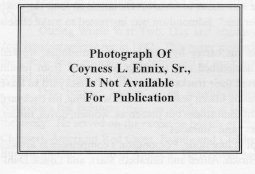 Coyness
Loyal Ennix, Sr., was an attorney and a political and civic leader in Nashville,
Tennessee. He was bom on September 21, 1901, in Hillsboro, Alabama, and
was the son of Frank and Channie Ennix. He began attending the North Alabama
Baptist Academy at the age of twelve. Coyness came to Nashville in 1918
and completed Roger Williams University on Whites Creek Pike. He wanted
to be a pharmacist, but a few visits to local courts convinced him to study
law. Ennix entered Howard University's School of Law in 1928 and completed
his studies in 1931, with the second-highest scholastic rank in the class.
Coyness
Loyal Ennix, Sr., was an attorney and a political and civic leader in Nashville,
Tennessee. He was bom on September 21, 1901, in Hillsboro, Alabama, and
was the son of Frank and Channie Ennix. He began attending the North Alabama
Baptist Academy at the age of twelve. Coyness came to Nashville in 1918
and completed Roger Williams University on Whites Creek Pike. He wanted
to be a pharmacist, but a few visits to local courts convinced him to study
law. Ennix entered Howard University's School of Law in 1928 and completed
his studies in 1931, with the second-highest scholastic rank in the class.
In 1932, Ennix gained admission to the bar. For the benefit of area blacks, he founded Nashville's Kent College of Law, where he trained local attorneys like Robert Lillard and Mose Davies. During some fifty years of practice, Ennix specialized in criminal cases. He handled about 3,000 cases before retiring to matters that came before the Probate Court during the last four years of his career. Around the courtroom, Ennix appeared well-dressed, flamboyant in style with big cigars, and well-versed in the law. At a time when black Nashvillians were turning their attention from the old elite, black Republican leaders to more middle-class and college-educated black Democratic leaders, Coyness L. Ennix became a local civic and political leader.
Coyness L. Ennix advanced as a local political leader during the late 1940s, when he became president of The Solid Block, an organization designed to unify the black community in its opposition to political discrimination. The Solid Block held mass meetings at First Colored Baptist Church and other local black churches to petition effectively against the poll tax. The organization published The Solid Block newspaper to keep blacks informed and involved in the protest. After thousands of signatures and many petitions were delivered to the Tennessee General Assembly, the poll tax was ended. In 1950, two blacks won seats to the City Council for the first time since 1911. Ennix lost his bid for a seat.
Ennix continued to be a local civic and political leader. He was the first black member of the Nashville Housing Authority. He gained appointment to the Nashville Board of Education and served through the integration uproar that forced Nashville to integrate its schools. He was a member of the city's Auditorium Commission, which directed the building of Municipal Auditorium. He also served as a member of the board of directors of the American Baptist Theological Seminary (now American Baptist College) and on the board of directors for the Eighteenth Avenue Community Center. He was a member of the Pride of Tennessee Lodge Number 1102, Benevolent and Protective Order of Elks.
In addition, Coyness Ennix was a religious leader. He served as superintendent of the Sunday school at First Colored Baptist Church (now First Baptist Capitol Hill) for more than 25 years and as a trustee and deacon of the church, as well as its unpaid legal adviser. Along with the Reverend Kelly Miller Smith and other First Colored Baptist Church leaders, Ennix helped guide the church through the black civil rights movement's turbulent years. First Colored Baptist Church gave courageous leadership to the sit-in demonstrations and the freedom rides.
Coyness E. Ennix, Sr., died on Wednesday, April 25, 1984. He was survived by his wife, Blanche Nivens Ennix, and three sons, Frank Martin, III, Coyness Loyal, and Russell Barbour.